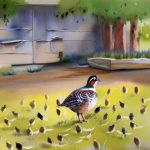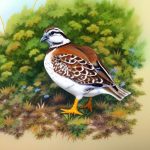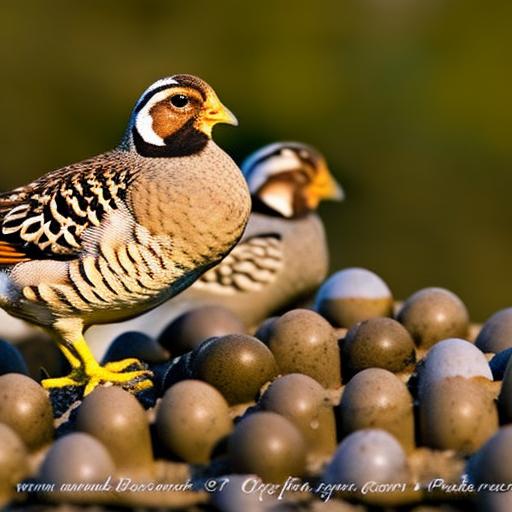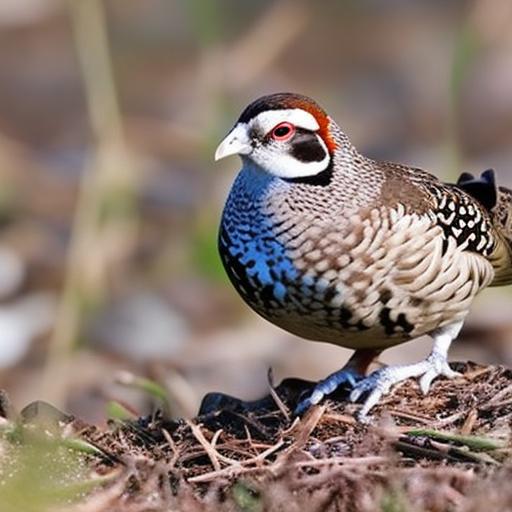Quail breeding pairs are essential for anyone looking to start a quail breeding operation. Understanding the dynamics of quail breeding pairs is crucial for successful breeding and production. A quail breeding pair typically consists of one male and one female quail. It is important to ensure that the pair is healthy, mature, and compatible for successful breeding. The male quail is responsible for fertilizing the eggs, while the female quail is responsible for laying and incubating the eggs. It is important to carefully select breeding pairs to ensure genetic diversity and to avoid inbreeding, which can lead to health issues and decreased fertility. Understanding the behavior and social dynamics of quail breeding pairs is also important for successful breeding. Quails are social birds and thrive in pairs or small groups, so it is important to provide them with appropriate social interaction and space to prevent stress and aggression within the pair.
Quail breeding pairs should be selected based on their health, genetics, and compatibility. It is important to choose pairs that are free from any genetic defects or health issues that could be passed on to their offspring. Additionally, selecting pairs with diverse genetic backgrounds can help prevent inbreeding and improve the overall health and vitality of the offspring. Compatibility between breeding pairs is also crucial for successful breeding. Observing the behavior of potential pairs can help determine if they are compatible and likely to breed successfully. It is important to monitor the interactions between the male and female quail to ensure that they are not aggressive towards each other, as this can hinder breeding success. Overall, understanding the dynamics of quail breeding pairs is essential for successful breeding and production.
Table of Contents
Key Takeaways
- Quail breeding pairs should consist of one male and multiple females to ensure successful breeding.
- When looking for quail breeding pairs for sale, it’s important to choose healthy, unrelated birds to avoid genetic issues.
- Considerations for breeding quail include providing a balanced diet, proper lighting, and a stress-free environment.
- Housing for quail breeding pairs should include separate nesting areas, protection from predators, and adequate space for exercise.
- The breeding and incubation process for quail involves collecting and storing eggs, incubating them at the right temperature and humidity, and caring for the chicks after hatching.
- Health and nutrition for quail breeding pairs should include a diet high in protein, access to clean water, and regular health check-ups.
- Tips for successful quail breeding include monitoring the breeding pairs closely, providing a comfortable environment, and seeking advice from experienced breeders.
Finding the Right Quail Breeding Pair for Sale
Finding the right quail breeding pair for sale is an important step in starting a quail breeding operation. There are several options for finding quail breeding pairs for sale, including local breeders, hatcheries, and online marketplaces. When looking for quail breeding pairs for sale, it is important to consider the reputation and experience of the seller. Reputable breeders and hatcheries will have healthy, well-cared-for birds and can provide valuable guidance and support for new breeders. It is also important to consider the quality and genetics of the quail breeding pairs being offered for sale. Look for breeders who prioritize genetic diversity, health, and compatibility when selecting their breeding pairs.
When purchasing quail breeding pairs, it is important to consider the logistics of transportation and quarantine. Ensure that the seller has appropriate shipping options if purchasing from a distance, and inquire about their quarantine procedures to prevent the introduction of diseases or parasites to your existing flock. Additionally, it is important to consider the cost of purchasing quail breeding pairs, as well as any additional expenses such as shipping or quarantine supplies. Overall, finding the right quail breeding pair for sale requires careful consideration of the reputation of the seller, the quality and genetics of the birds, and the logistics of transportation and quarantine.
Considerations for Breeding Quail
Breeding quail requires careful consideration of several factors to ensure successful reproduction and healthy offspring. When breeding quail, it is important to consider the age and health of the breeding pairs. Quails typically reach sexual maturity at around 6-8 weeks of age, but it is best to wait until they are at least 12 weeks old before allowing them to breed. Breeding younger quails can lead to health issues and decreased fertility. Additionally, it is important to ensure that the breeding pairs are in good health before allowing them to breed. Providing a balanced diet, appropriate housing, and regular health checks can help ensure that the breeding pairs are healthy and ready for reproduction.
Another important consideration for breeding quail is providing appropriate nesting materials and conditions for successful egg laying and incubation. Female quails require a suitable nesting area with soft bedding material to lay their eggs. Providing nesting boxes or areas with suitable materials such as straw or shredded paper can encourage egg laying and provide a comfortable environment for incubation. It is also important to provide a quiet and secure environment for the breeding pairs to reduce stress and disturbances during the breeding process. Overall, careful consideration of the age, health, nesting conditions, and environment is crucial for successful quail breeding.
Housing and Care for Quail Breeding Pairs
Proper housing and care are essential for maintaining healthy quail breeding pairs and ensuring successful reproduction. When housing quail breeding pairs, it is important to provide adequate space and suitable housing conditions. Quails are social birds and thrive in pairs or small groups, so it is important to provide enough space for each pair to establish their territory and reduce aggression. Providing a secure and predator-proof housing structure is also crucial for protecting the breeding pairs from potential threats.
In addition to suitable housing, providing proper care for quail breeding pairs includes ensuring a balanced diet, access to clean water, and regular health checks. Quails require a diet high in protein to support reproduction, so it is important to provide a commercial game bird feed or a balanced mix of seeds, grains, and insects. Additionally, providing access to clean water at all times is essential for maintaining hydration and supporting egg production. Regular health checks can help identify any potential issues or diseases early on, allowing for prompt treatment and prevention of spread within the flock. Overall, providing proper housing and care for quail breeding pairs is essential for maintaining their health and ensuring successful reproduction.
Breeding and Incubation Process
The breeding and incubation process is a crucial stage in quail production that requires careful attention to ensure successful hatching and healthy offspring. When breeding quails, it is important to monitor the behavior of the breeding pairs to determine when mating occurs. Male quails will often display courtship behavior such as strutting or vocalizing to attract females, while females may exhibit receptive behavior such as crouching or vocalizing in response. Observing these behaviors can help determine when mating occurs and when eggs are likely to be laid.
Once eggs are laid, it is important to collect them promptly to prevent damage or contamination. Eggs should be stored in a cool, dry environment with consistent temperature and humidity until they are ready for incubation. When incubating quail eggs, it is important to use a reliable incubator with accurate temperature and humidity control. The optimal temperature for incubating quail eggs is around 99-100 degrees Fahrenheit, with a humidity level of around 50-60%. Turning the eggs several times a day during the incubation period can help prevent the embryos from sticking to the shell membrane and promote even development.
After approximately 17-18 days of incubation, the quail eggs will begin to hatch. It is important to monitor the hatching process closely and provide a quiet and stable environment for the newly hatched chicks. Once hatched, the chicks should be transferred to a brooder with appropriate heat lamps, bedding material, and access to food and water. Providing proper care during the hatching process is essential for ensuring healthy chicks and successful reproduction.
Health and Nutrition for Quail Breeding Pairs

Maintaining the health and nutrition of quail breeding pairs is essential for successful reproduction and overall well-being. Providing a balanced diet with adequate protein, vitamins, and minerals is crucial for supporting egg production and fertility in breeding pairs. Commercial game bird feeds or a mix of seeds, grains, and insects can provide the necessary nutrients for quails to thrive during the breeding process. Additionally, providing access to clean water at all times is essential for maintaining hydration and supporting egg production.
Regular health checks are also important for monitoring the well-being of quail breeding pairs. Observing their behavior, appetite, and physical condition can help identify any potential health issues early on. Common health issues in quails include respiratory infections, parasites, and nutritional deficiencies, so it is important to address any concerns promptly with appropriate treatment or adjustments to their diet or environment.
Maintaining a clean and hygienic environment is also crucial for preventing disease and promoting overall health in quail breeding pairs. Regularly cleaning their housing structure, providing fresh bedding material, and removing any waste or debris can help reduce the risk of disease transmission within the flock.
Overall, maintaining the health and nutrition of quail breeding pairs through a balanced diet, regular health checks, and a clean environment is essential for successful reproduction and overall well-being.
Tips for Successful Quail Breeding
Successful quail breeding requires careful attention to several key factors that can influence reproduction and overall productivity. Providing suitable housing conditions with enough space for each pair to establish their territory can help reduce stress and aggression within the flock. Additionally, providing appropriate nesting materials such as straw or shredded paper can encourage egg laying and provide a comfortable environment for incubation.
Monitoring the behavior of breeding pairs can also provide valuable insight into their reproductive readiness. Observing courtship behaviors from male quails such as strutting or vocalizing can indicate mating readiness, while receptive behaviors from female quails such as crouching or vocalizing in response can signal their readiness to lay eggs.
Maintaining a balanced diet with adequate protein, vitamins, and minerals is crucial for supporting egg production and fertility in breeding pairs. Providing access to clean water at all times is also essential for maintaining hydration and supporting egg production.
Regular health checks can help identify any potential issues early on, allowing for prompt treatment or adjustments to their diet or environment as needed.
Overall, successful quail breeding requires careful attention to housing conditions, nesting materials, behavior monitoring, nutrition, hydration, regular health checks, cleanliness, incubation process monitoring during hatching process among other factors that contribute towards successful reproduction.
Overall, successful quail breeding requires careful attention to housing conditions, such as providing adequate space and proper ventilation, as well as nesting materials to create a comfortable and safe environment for the quails to lay their eggs. Monitoring the behavior of the quails is also important to ensure they are not stressed or aggressive towards each other. Additionally, providing a balanced diet and ensuring proper hydration is essential for the health and reproductive success of the quails. Regular health checks should be conducted to detect and address any potential issues early on. Cleanliness is also crucial to prevent the spread of diseases and maintain a healthy environment for the quails. Monitoring the incubation process during hatching is important to ensure the eggs are developing properly and to intervene if necessary. These factors, along with others, all play a critical role in contributing towards successful reproduction in quails.
Looking for a quail breeding pair for sale? If you’re interested in raising quails, you might also want to check out this informative article on chicken coop portage. It provides valuable insights into creating a comfortable and secure environment for your poultry. Whether you’re new to raising birds or looking to improve your coop setup, this article offers practical tips and advice to help you get started.
FAQs
What is a quail breeding pair?
A quail breeding pair consists of a male and a female quail that are kept together for the purpose of producing offspring. They are typically selected for their desirable genetic traits and are used to breed quail for meat, eggs, or as pets.
What are the benefits of purchasing a quail breeding pair?
Purchasing a quail breeding pair allows individuals to start their own quail breeding program without having to source individual birds separately. It also ensures genetic diversity and can lead to a more successful breeding program.
What should I consider before purchasing a quail breeding pair?
Before purchasing a quail breeding pair, it is important to consider the space and resources needed to properly care for the birds and their offspring. Additionally, it is important to research the specific breed of quail and their breeding requirements.
Where can I find quail breeding pairs for sale?
Quail breeding pairs can often be found for sale through local breeders, poultry farms, or online marketplaces. It is important to ensure that the seller is reputable and that the birds are healthy and well-cared for.
What should I look for when purchasing a quail breeding pair?
When purchasing a quail breeding pair, it is important to look for birds that are healthy, active, and free from any signs of illness or injury. It is also beneficial to inquire about the birds’ genetic background and breeding history.
Meet Walter, the feathered-friend fanatic of Florida! Nestled in the sunshine state, Walter struts through life with his feathered companions, clucking his way to happiness. With a coop that’s fancier than a five-star hotel, he’s the Don Juan of the chicken world. When he’s not teaching his hens to do the cha-cha, you’ll find him in a heated debate with his prized rooster, Sir Clucks-a-Lot. Walter’s poultry passion is no yolk; he’s the sunny-side-up guy you never knew you needed in your flock of friends!







